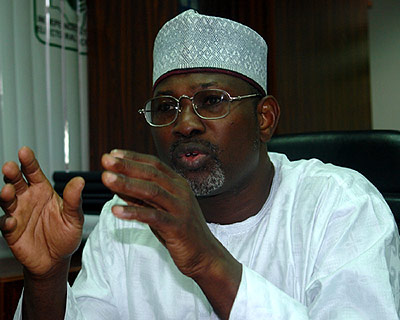Federal Capital Territory (FCT) residents were not impressed by the Independent National Electoral Commission (INEC) during the recent voter registration for 2015 ballot, which was plagued by all manner of shortcomings.
Prof Attahiru Jega, INEC chairman
The result: thousands were not registered and would be disenfranchised.
Many who sought registration during the five-day exercise, which spanned August 20 to August 25, walked away in frustration.
Long queues, no DDC machines
In nearly all the six Area Councils and 62 political units in the FCT, there were long queues but short supply of Direct Data Capture (DDC) machines.
In Kuje Area Council, most people who visited ward centres, the registration points, were not registered because of shortage of DDC machines or over crowding.
Besides, many rural dwellers could not access the registration centres because of long distances and high fares of motor bikes or taxis. That is where the roads are motorable.
In Guabe Ward, it took a complaint from a party official to the electoral officer (EO) in the Area Council for the exercise to take off properly after two days.
All Progressives Congress (APC) Chairman in Kuje Area Council, Godwin Poyi, said: “I came here the first day to observe how the exercise was going and what I saw shocked me. The only DDC machine that was deployed here to serve the entire ward as big as this, was not working.
“The whole place was crowded with people who enthusiastically trooped out to register. Many of them got frustrated that first day. It continued the second day, so I had to go personally to the EO in Kuje to lodge a complaint. The man promised to remedy the situation.”
Guabe Ward APC Secretary, Bala Gajere, added that the residents found the exercise frustrating.
“People were coming here from far distances and those who came in the first two days but could not be registered due largely to the shortage of the machine refused to come back because of the high cost of transportation.
“This is raining season and the roads in these rural places are not motorable. Most people can only get here on bikes and this costs so much and they can hardly afford the amount bike operators are charging. When they came once or twice and couldn’t register, they stopped,” Gajere stated.
The frustration was so great that FCT residents marched to the INEC office in Area 10, Garki to stage a protest. One of them narrated that she visited 17 centres and still could not register.
They demanded an extension of the registration by two weeks, insisting that nobody should prevent them from voting in the 2015 elections.
INEC refuses to budge
However, the INEC turned a deaf ear to the complaints.
A statement issued by Kayode Idowu, Chief Press Secretary to INEC Chairman, Attahiru Jega, said: “Much as the Commission is eager to ensure that all legitimate persons who are yet to register as voters have the opportunity to do so, it is logistically impossible to extend this phase of the CVR beyond its scheduled deadline (i.e., Monday, August 25, 2014). “But in order to give fair chance to legitimate registrants, the Commission will, on a date to be shortly announced, set up registration points at its Local Government Area (LGA) offices where people yet to do so can go to register.
“INEC notes with deep regret that old tendencies towards irregularity, such as partisans urging people to come out and do multiple registrations, largely accounted for the crowd clusters lingering at registration points set up for the CVR by the Commission.
“Many other people who have relocated since the last registration exercise and only needed to apply for their registration status to be transferred to their new location also turned up for fresh registration.
“When data are consolidated and de-duplication is carried out by the INEC, all instances of multiple registrations will yet be eliminated. But, unfortunately, these sets of people obstructed legitimate registrants from having their turn at the registration points.”
The statement appealed that anyone who previously registered and has a record in the biometric register of voters should not re-present himself at any other place for registration.
It added that:
• If a previously registered person has relocated from where he registered, he should apply for transfer of the data to the new location, as mandated by the Electoral Law.
• If anyone found his name on the register displayed ahead of the distribution of permanent voter cards (PVCs), but was unable to collect his PVC during the distribution period, he should go to the council office of the INEC to collect it.
The INEC urged all stakeholders to play by the rules to ensure free, fair, and credible elections.
INEC unhappy with poor publicity
In his own reaction, INEC Public Relations Officer (PRO) in the FCT, Okezie Nwankwo, maintained that “with the prevailing circumstances, the registration was satisfactory.”
But it was learnt that the INEC national leadership was not satisfied with the poor publicity given to the exercise in the FCT.
Many residents, especially in the rural areas, did not know about the registration. Others who knew and wanted to register could not trace their registration centres.













